The grants process
The Max e-Grants programme provides small grants of up to $5,000 to Ministry of Education licensed New Zealand schools and pre-schools to support children aged 4-18 years to achieve educational participation.

Who is eligible to apply?
The Max e-Grants programme provides small grants of up to $5,000 to Ministry of Education licensed New Zealand schools and pre-schools to support children aged 4-18 years to achieve educational participation. The aim of the programme is to support individual children or small groups of children so they won't feel isolated or left out of activities due to social or economic disadvantages beyond their control.
Each school is asked to limit their applications to ONE (1) per Grant Round. If a school lodges two applications, it is unlikely that more than one application per school will be granted.
There are only two rounds per year.
Should a school be successful in their application in one round, they will not be able to apply in the round immediately following.
All successful applications must complete an acquittal form.
We strongly encourage you to read through all the FAQs to help with the success of your application.
What is required to get a grant?
There are three stages to receiving a successful grant:
- The grant application
- The grant agreement form
- The grant acquittal form
All stages must be completed if successful.
When does the funding need to be spent?
Funding for the current round must be used on projects carried out between 22 July and 20 December 2024. It cannot be used retrospectively for projects underway or completed before 22 July 2024. If your project is scheduled for after 20 December 2024, then please wait and apply in the next round.
What can the grants be used for?
Assistance may be given by way of financial support based on the following categories:
- Equipment and resources (e.g. sports equipment, stationery)
- Excursions or camps (e.g. annual year camps or one-off excursions)
- Extracurricular activities (e.g. club fees, swimming lessons etc.)
- Teacher support or tutoring (e.g. in-class aides, external tutoring)
- Uniforms (e.g. sports or school)
Additional assistance
For any other information about the Max e-Grants programme, please check out our FAQs .
If you require specific help with your online application, please click here for our Application Software Help Guide . There is also an example application available that may help you write your application.
Or alternatively, complete this online contact form for any other questions.
How to finalise and report on the outcomes of a project.
Login to your Grantmaking account and click the ‘requirements’ tab at the top of the page. Then use the drop-down menu (on the right of the page) to select New, and you will find the form there.
Acquittals report on what took place and how the grant was spent.
We understand teaching staff change, but the grant is accepted by the school Principal, and the school needs to make arrangements for someone who has been involved with the project to write the acquittal. If your school has an un-acquitted grant, future applications will not be considered.
As part of the approval process for your acquittal, it will be compared to your original application; therefore, you need to explain if there are any differences.
Please provide as detailed a report as possible and attach relevant images. Information from acquittals assists in increasing sponsorship for the programme, which increases the budget for all schools applying in future rounds.
Please provide as much information as you can about what was achieved with the grant, including outcomes or changes observed in the recipient's behaviour and academic performance.

Charitable Trust
Grants Approved
To date Make It Happen has paid out over $235,000 in grants to children and their families in our community. This graph below gives an overview to the wide range of areas in which we approve grants.
Grant Expenditure Overview
Recently approved grants.
Click on a menu item to view individual grants approved.
Make It Happen
Would you like to apply for a grant? Simply complete the on-line application form below:

If you require a paper copy of the form to be sent to you please e-mail [email protected]
Copyright - Make It Happen Charitable Trust 2017 Graphic design and website by Clockwise

- Auckland Uniservices Limited
- Kiwi Innovation Network Limited
- New Zealand-China Strategic Research Alliance 2024 Call for Proposals
- New Zealand–China Strategic Research Alliance 2023
- e-ASIA Joint Research Programme Call for Proposals 2024
- Funded projects
- COVID-19 Innovation Acceleration Fund
- A Nation of Curious Minds – He Whenua Hihiri i te Mahara
- CREST Awards
- Participatory Science Platform
- Powering Potential programme
- Prime Minister's Science Prizes
- Rutherford Medal
- Science Media Centre
- Science Learning Hub
- Science Teaching Leadership Programme
Talented School Students Travel Awards
- Unlocking Curious Minds contestable fund
- 2023 Endeavour Fund successful proposals
- Research Programmes Call for Proposals 2024 investment round - Endeavour Fund
- Smart Ideas Call for Proposals 2024 investment round - Endeavour Fund
- Envirolink Scheme
- Application and assessment information
- Assessment panel
- Urgent scientific research and data collection
- Research needs of affected Māori communities
- Extreme Weather Recovery Advice Fund
- Tahua o He tipu ka hua Tono Marohitanga
- Ngā Puanga Pūtaiao
- He tipu ka hua investment fund Call for Proposals
- He aka ka toro navigation fund 2023 successful projects
- Ngā Puanga Pūtaiao Fellowship
- MBIE Science Whitinga Fellowship
- The 11 challenges
- Essential documents
- Mid-way review
- Successful 2018 proposals
- Otago Innovation Limited
- New Zealand Forest Research Institute Ltd (Scion)
- Funded programmes
- Funded infrastructure
- RRI background
- Xerra Earth Observation Institute
- Bragato Research Institute
- New Zealand Institute for Minerals to Materials Research
- PlantTech Research Institute
- RRI Performance Framework
- Who got funded
- Mahere Haumi 2024 - Te Tahua Whakahaka o Te Pūnaha Hihiko: Vision Mātauranga
- Te Pūnaha Hihiko: Vision Mātauranga Capability Fund 2024 Investment Plan
- Success stories
The Talented School Students Travel Awards supports our talented intermediate and secondary school students attend international science and technology events.
On this page

This award provides financial support to intermediate and secondary school students who have been selected on a national basis to represent New Zealand at internationally recognised overseas science, mathematics or technology events.
Students chosen to represent New Zealand internationally through a national or international competition or selection basis can apply to the Talented School Students Travel Awards to then formally request funding to cover their travel costs.
The Talented School Students Travel Award is funded by MBIE and administered by the Royal Society Te Apārangi.
Talented School Students Travel Award (external link) — Royal Society Te Apārangi
Crown copyright © 2024
https://www.mbie.govt.nz/science-and-technology/science-and-innovation/funding-information-and-opportunities/investment-funds/curious-minds/talented-school-students-travel-awards Please note: This content will change over time and can go out of date.
This website may not work correctly because your browser is out of date. Please update your browser .

"To advance and encourage business understanding of Parliament and parliamentarians' understanding of the business community of New Zealand"

Travel assistance for schools
The Trust is active in promoting education and understanding of Parliament. It does this by providing funds for school visits to Parliament and Prizes in politics and public policy at various universities in New Zealand.
The Travel Fund Programme for Schools to visit Parliament is designed to assist, encourage and support schools in bringing students to Parliament. Financial support takes the form of a ‘contribution’ to the costs associated in traveling to Wellington rather than a full grant meeting all costs.
Related files
Find out more information about the NZBPT
New Zealand Business & Parliament Trust
Copyright © 2021. All Rights Reserved
EDUCATION.govt.nz For parents and whānau Practical information about education for parents and carers
Primary school 5–12 years old
School transport assistance.
We provide school transport assistance to help you overcome barriers to education and meet your responsibility to get your children to school. We may provide assistance where distance and/or accessibility is a barrier for students attending the closest school they can enrol at. Find out if your child is eligible for school transport assistance.
Eligibility criteria
- Apply for assistance
Bus routes, stops and keeping your child safe
School transport assistance is usually a place on a school bus. It can also be an allowance that contributes to the cost of the c aregiver transporting their child to school.
For information about school transport assistance for children and young people with safety and/or mobility needs, visit the page:
Specialised School Transport Assistance (SESTA)
Your child must meet all 3 eligibility criteria to get school transport assistance:
- The school must be the closest state or state integrated school your child can enrol at. For students attending a state integrated school, it must be the closest school of its type, i.e. the closest Catholic school if a Catholic education is chosen.
- Years 1-8: At least 3.2 km from the school (over the shortest public road or pedestrian route from home roadside gate to the school’s front gate).
- Years 9-13: At least 4.8 km from the school (over the shortest public road or pedestrian route from home roadside gate to the school’s front gate).
- There must be no suitable public transport options.
Māori-medium schools eligibility – Ministry of Education (external link)
Conveyance allowance criteria
Your child may be eligible for a conveyance allowance if they meet all 3 criteria above and:
- there isn’t a school bus available, or
- they live more than 2.4 km from the nearest school bus route.
“Suitable” public transport
“Suitable” public transport is public transport that travels within:
- 2.4 km of the roadside gate of your home, and
- 2.4 km of the closest appropriate school.
- be picked up before 7am
- arrive at school before it starts
- can be picked up no later than 1 hour after school finishes
- change buses more than once on a journey.
Your school will tell you if a Ministry-funded service is cancelled because public transport has become available.
To apply for school transport assistance, talk to your child’s school about whether they are eligible for:
A place on a school bus
The school’s bus controller will arrange the details of the transport with you.
A conveyance allowance to help with transport costs
If your child meets the criteria for a conveyance allowance (see above) , you can apply online. S tart the application and submit to your school who will complete their section of the application an d send to us.
Conveyance Allowance application – Taku education (external link)
We keep your child's information secure. Personal information in the application is required for us to decide whether your child qualifies for school transport assistance and for reporting and evaluation purposes.
A privacy statement explaining how we will manage your personal information can be found on our website. (external link)
Legal and privacy – Ministry of Education (external link)
Routes are designed by the Ministry of Education, and bus companies decide where the safest stops are along the route. For information about routes and stops, contact your school.
For tips about what you as a caregiver can do to keep children safe, and information about behaviour problems, vehicle safety, and driver checking, visit the page:
Safety and behaviour – Ministry of Education (external link)
For more information about how accidents and incidents are managed, visit the page:
Accidents and incidents – Ministry of Education (external link)
Every school receiving school transport bus services has a designated bus controller. Contact your school and speak to the bus controller for questions relating to eligibility, bus routes and bus stops.
If you have queries regarding applications for SESTA, general conveyance allowance or payments, contact us:
0800 287 272 (external link)
Last reviewed: 13 February 2024 Has this been useful? Tell us what you think.
- $(window).on("load",function () { $('.loader').animate({ opacity: 1 }, 500); }); Dashboard Edit Profile Change Password Sign Out Sign in Sponsor a child Donate $(document).ready(function () { var e = setInterval(function () { if ("" != $(".dropdown-toggle").text().trim()) { //logged in clearInterval(e); $(".variety-cta-container .header-cta").removeClass("d-md-inline-block"); $(".variety-main-nav .header-cta").addClass("d-none"); } else { //not logged in $(".variety-cta-container .header-cta").addClass("d-md-inline-block"); $(".variety-main-nav .header-cta").removeClass("d-none"); } }); var tpcReady = setInterval(function () { if (typeof tpc != 'undefined') { $(".user-email-address").text(tpc.identity.userEmail) clearInterval(tpcReady); } }); }); Donate Give once
Find support
How can we help you?

The next step is easy.
We have different ways to help you.
Let's start by finding out which option is right for you and your child.
Click HERE to download and read our Te Reo M ā ori brochure .
Click HERE to download and read our Gagana Samoa brochure.
Click HERE to download and read our English brochure.

Kiwi Kid Sponsorship
Kiwi Kid Sponsorship (KKS) provides ongoing support for children from 4 to 17 years old.
Children on KKS are matched to a sponsor who helps pay for the cost of essential things like clothing, towels, bedding, school uniforms and stationery, school camp and extracurricular activities like swimming or music lessons.
Children on KKS also get $300 each year to spend on sport and play through the Active Me – Kia Tū programme.

Active Me – Kia Tū
Active Me - Kia Tū is a fund created in partnership with Sport NZ. It’s designed to get Kiwi kids involved in play, activities, and sports – so they can participate in the things they love to do.
As part of Kiwi Kid Sponsorship, all sponsored children receive an Active Me grant of $300 to help them get active and moving.
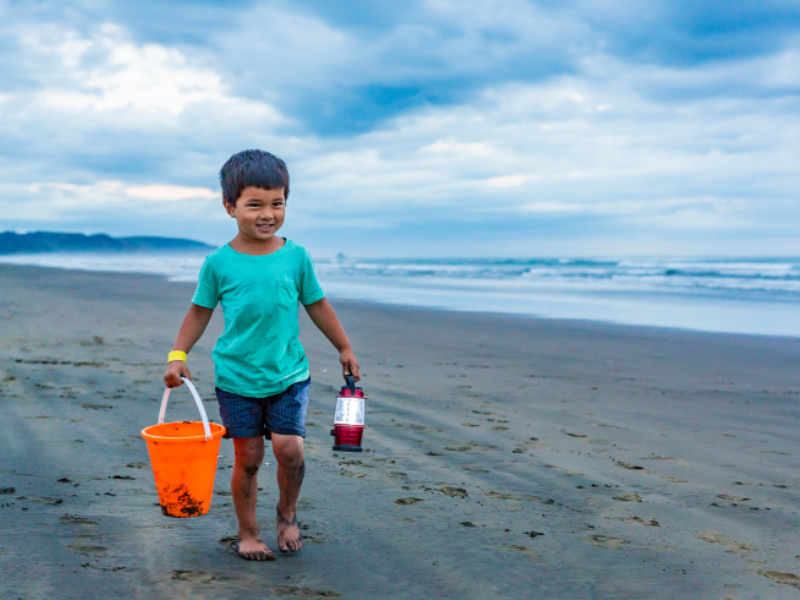
Individual Grants
An individual grant is a one-off payment. This can be spent on:
- Everyday essentials (bedding, clothes, shoes)
- School costs (uniforms)
- Extracurricular activities
- Medical fees and equipment
- Technology.
Individual grants are given every four months to caregivers of children from 0 to 18 years.
Individual grants are reviewed on a case-by-case basis and are not guaranteed.
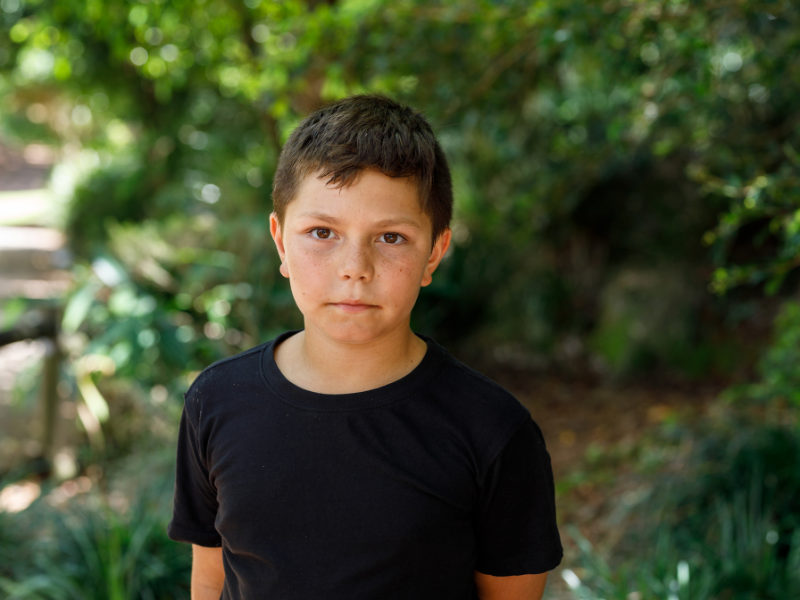
Do you know a child who needs help?
Variety helps pay for the costs of essential things children need to stay healthy, to go to school and to take part in their community
You can apply for Kiwi Kid Sponsorship or an Individual Grant on behalf of a child in need.
Got any questions about Kiwi Kid Sponsorship?
Frequently asked questions, how do i apply for kiwi kid sponsorship +, can i apply for multiple children from one family +, how long until the application is reviewed +, how long do i have to wait for a sponsor +.

Keep updated with the latest Variety news, events and hero stories.
How you can help
Find support.
Variety is a registered charitable organization under the Charities Act 2005.
Our Charities Commission registration number is CC24039.

- Information for Young People
- Working with Young People
- Resources and Reports
- Ākonga Youth Development Community Fund
- Current Funding
- Previous Funding
- Partnership Fund
The Ministry of Youth Development (MYD) – Te Manatū Whakahiato Taiohi – spends around $12.062 million (excluding the Ākonga Youth Development Community Fund) per year on a wide range of youth development and youth enterprise initiatives. We fund organisations that employ a youth development approach which supports the wellbeing of young people (aged 12 to 24 years) in Aotearoa New Zealand.
He Kākano
He Kākano (a seed) is a $2 million collaboration between MYD and The Prince’s Trust Aotearoa New Zealand (PTNZ) to provide seed funding, mentoring support, access to shared support services, and entrepreneurial skill development to young people (aged 17 – 30 years). Information on He Kākano can be found on PTNZ’s website .
The Te Kete Aronui report and suite of resources was developed in collaboration with PTNZ. The Te Kete Aronui ecomaps, educational worksheets, case studies, and measurement frameworks are designed to give young people a set of tools to support their development and learning journey, taking the step up towards applying for He Kākano, and into the business world beyond.
MYD Funding (2023-2025)
Information on programmes, services, and initiatives currently funded by MYD (2023-2025) can be found here . Queries can be directed to MYDfunding[at]msd.govt.nz . Please click here to learn more about programmes funded through the Ā konga Youth Development Community Fund.
Ākonga Youth Development Community Fund
The Ministry of Youth Development (MYD) – Te Manatū Whakahiato Taiohi, in partnership with the Ministry of Education(MoE) – Te Tāhuhu o te Mātauranga, launched the Ākonga Youth Development Community Fund – Strengthening Ākonga Resilience to Achieve Better Education Outcomes in late 2020. This iteration of the fund ended on 31 December 2023. The new iteration of the fund is known as Ākonga Youth Development Community Fund – Strengthening Ākonga Resilience to Achieve Better Pathways for Success.
More information is available on the Ākonga Youth Development Community Fund webpage .
Social Services Accreditation
Providers contracted by MYD must have the capability and capacity to deliver quality social services on an on-going basis.
Social Services Accreditation assesses organisations, often under legislation, against a set of standards at a level that reflects the type of services they deliver. This means that both the Government and the provider’s clients can be confident in the services that are delivered.
New Zealand Government Procurement
MYD adheres to the 'Government Rules of Sourcing' when purchasing outcomes/contracting with providers. Please visit the New Zealand Government Procurement website for more information.
Grants Overview
Grant Guidelines
Eligibility & Registration
What We Can & Can't Fund
- Apply For A Grant
Approved & Declined Grants
Responsible Gambling
Complaints Procedure
Self-Exclusion Form
Meet The Team
Directors & Net Proceeds Committee
Annual Report
Audit Report
- Privacy Statement

The Cut-Off date for our April Meeting is
15 march 2020, authorised purpose.
One Foundation is licensed to make grants for the following authorised purposes:
a. Any purpose which for the time being constitutes a charitable purpose in New Zealand, including, without limitation: i. The advancement of education; ii. The promotion of scientific research and learning; iii. The promotion and support of the relief of poverty, including physical welfare; iv. The promotion and support of other purposes beneficial to the community, including literature and the arts;
b. A non-commercial purpose that is beneficial to the whole or a section of the community; and
c. Promoting, controlling, and conducting race meetings under the Racing Act 2003, including the payment of stakes.
What We Fund
The Following are Authorised Purposes for which Net Proceeds can be Distributed.
ARTS, COMMUNITY AND CULTURE
Programs that support youth at risk. Recognised cultural and community organisations to further the objects of those groups. To provide for the maintenance, refurbishment and well-being of local marae.
Schools and other educational institutes for equipment and student amenities for educational advancement not covered by government funding.
HEALTH AND WELFARE
Support services for communities.
Donations to amateur sport teams and clubs competing in recognised leagues and tournaments. Ground Hire. Playing uniforms. Provision of actual and reasonable travel expenses for groups participating in tournaments with kindred groups. Sports Equipment.

What We Can't Fund
The Following is a List of Purposes that CAN NOT Receive Net Proceeds
- Payment to horse or greyhound owners or trainers.
- Payments to professional jockeys.
- Activities or expenses relating to the breeding of race horses or greyhounds.
- Grants can only be issued to sport teams/clubs that are formally established and/or legally constituted or can show affiliation to the national organisation.
- Touch modules must provide a photocopy of their Touch NZ membership card.
- No grant will be issued to a player or team competing on a professional basis.
- No One Foundation venue can have direct commercial interest in the success of an application.
- Applications cannot be for events or teams that are not open to the wider community.
- This includes work and industry competitions, private clubs, union groups, police and armed forces.
- Applications cannot be made by individual teams from within a club.
- No grant will be approved for the provision of loans, mortgages, food, beverages, bar facilities, and mobile phones.
- Applications must not be for goods, services and expenses already purchased at the time of application.
For more information on what the DIA determine to be and not to be an Authorised Purpose, please click here.
Lest we forget
When you go home tell them of us and say for your tomorrow we gave our today.
Kia Ora Bonjour Bula Ciao Chao ban Dobrý den! G'Day Goeie Dag Guten Tag Hallo Hola Howzit Konnichiwa iHola! Molo Marhaban Merhaba Namasté Ni Hao Ola Om Swastiastu Salaam Sawubona Susaday Sveiki Talofa Yassou zdrAstvuy

PHONE 07 345 7070
Apply for a Grant
Grants Help
Grants Photo Gallery
© Copyright 2020 One Foundation
Share on our Facebook page .
OUR PARTNERS

Eco-Schools
Eco-Schools is the largest global sustainable schools programme – it starts in the classroom and expands to the community by engaging the next generation in action-based learning. The programme encourages young people to engage in their environment by allowing them the opportunity to actively protect it.

Welcome to Eco-Schools
Eco-Schools is operated internationally by the Foundation for Environmental Education (FEE) and is managed in New Zealand by Keep New Zealand Beautiful. It currently has 19.5 million students and educators, from 59,000 schools in 74 countries, engaging with its sustainable development education programme. FEE is a non-governmental and non-profit organisation whose aim is to promote sustainable development globally through environmental education.
Why Eco-Schools?
The Eco-Schools programme is an ideal way for schools to embark on a meaningful path towards improving the environment in their school and local community, while at the same time having a life-long positive impact on the lives of young people, their families, school staff and the community.
Young people experience a sense of achievement at being able to have a say in the environmental management policies of their schools and are ultimately rewarded with the opportunity to become a Green Flag school – an internationally recognised status.
Who is involved in the Eco-Schools programme?
The Eco-Schools programme is run according to an all-inclusive, participatory approach involving students, teachers, and the local community at large. However, it is, at its heart, a student-led initiative.
How does Eco-Schools work?
The Eco-Schools programme consists of three elements:
- The Seven Steps to progress through
- The Twelve Topics to choose from
- The Green Flag assessment.
NOTE : The most important aspect for schools to remember is that we acknowledge that every school is different and it is therefore critical that a school fits the Seven Steps around its circumstances and situation and NOT try to fit the school into the Seven Steps. We want Eco-Schools to work for you!
The Eco-Schools programme also never dictates the environmental actions or projects that a school should work on. This is a great strength of the programme: it allows students to take control; it allows local problems to be tackled; it allows young people to work on the issues they are passionate about; it is inclusive to everyone.
The Seven Steps
The Seven Steps are designed to make environmental actions student-led. Working through each of the Seven Steps and achieving Green Flag accreditation can be done in a single academic year or can take longer if needed.
Several of the Seven Steps, for example Step 6: Community and Step 7: Eco-Code, naturally overlap and this is encouraged – the process is designed to be holistic. Below is a brief summary of each step. But further detail, examples, criteria and resources can be found in the individual Step Guides you will receive access to when you register. We recommend checking these guides before you begin to ensure you make your Eco-Schools journey a success!
The first step is to form an Eco-Committee to represent the ideas of your whole school. The Eco-Committee takes responsibility for Eco-Schools projects and will ensure the whole school and community is involved.
The Eco-Committee then completes the second step, an Environmental Review , to investigate the current situation in the school. The Environmental Review is a tool designed to help the Eco-Committee decide what is going well in the school and what topics to work on.
The results of the Environmental Review are used to create an Action Plan outlining the three topics (two that are chosen by the Eco-Committee, plus Litter) that the Eco-Committee has decided to focus on, and the projects related to those topics. Eco-Schools New Zealand has Twelve Topics – Biodiversity, Climate Change, Energy, Food, Global Citizenship, Health & Wellbeing, Litter (compulsory topic), Marine & Coast, School Grounds, Transport, Waste and Water.
The Action Plan is a working document which tracks the progress of your projects against your three topics and their Sustainable Development Goals.
The Action Plan needs to include ways of measuring the progress of the projects, as well as recording ideas for future development. To find out whether you are successfully achieving the targets set out in your Action Plan, you must measure your progress.
Your projects should be linked to The New Zealand Curriculum. Linking to the curriculum integrates Eco-Schools into daily learning across subjects. This can range from a short reference when a curriculum topic warrants it, to full-scale linking so that projects fully cover particular curricular experiences and outcomes.
A key aim of Eco-Schools is to involve your whole school and the wider community . It is important that everyone in the school has the opportunity to be involved in your Eco-Schools projects. Making links across the school and wider community gives others the opportunity to be involved, giving students a chance to make real change.
Finally, the whole school crafts an Eco-Code representing their commitment to environmental issues. Your Eco-Code is a statement that simply sums up your school’s commitment to environmental issues.
The Twelve Topics
Schools in New Zealand can choose from a menu of Twelve Topics when implementing their Eco-Schools work. Although all Twelve Topics must be included in the Environmental Review, schools can decide which three topics they will focus on. Staying true to the mission of Keep New Zealand Beautiful we ask that one of the three focus topics be Litter. Find out more about the Twelve Topics .
The Eco-Schools Green Flag
The work embarked upon as you move through the Seven Steps is recognised by the Green Flag Award – a visible indication of your school’s commitment to learning for sustainability, and an internationally recognised accreditation for excellence in sustainable development education. A Green Flag is the perfect way to acknowledge, reward and celebrate the ecological achievements of your students. It demonstrates that their hard work is appreciated and it provides them with the confidence and motivation to continue actively engaging with environmental issues.
Getting started
Schools register online usually at the start of the year, then with our guidance, they will take manageable steps towards reaching their Green Flag accreditation. Even better registration is FREE!

Receive our newsletter
- Name This field is for validation purposes and should be left unchanged.
Overseas Relocation Grant
As an overseas-trained teacher coming to New Zealand, you may be eligible for the grant which covers relocation costs of up to NZD$10,000.
The grant can cover or contribute towards a range of relocation costs including registration with the Teaching Council of Aotearoa New Zealand, temporary accommodation in New Zealand, airfares and relocation costs for immediate family members.
Funding of grants is capped each year. Grants are offered across the primary, secondary and early learning sectors each year and allocated on a first-come, first-served basis.
We monitor allocations closely and this page will be updated if allocations have been exhausted.
Overseas Relocation Grant eligibility
As an overseas-trained teacher, to be eligible for the grant you must:
- be registered with and certified by the Teaching Council of Aotearoa New Zealand
- be starting your role between 1 July to 30 June of each calendar year that the grants are available
- have a full-time employment agreement of at least 12 months
- have made the move here and have a valid work or residence visa allowing you to live in New Zealand
- apply for the grant within 90 days of starting full-time employment in your school or early learning centre
- have not held a teaching role in a New Zealand state or state-integrated school or licensed early learning service for the 12 months prior to your start date.
Eligible expenses and payment
If your application is approved the amount paid will be the total of all eligible items for which proof of expenditure has been provided.
The grant is paid in a single instalment, normally within 6 to 8 working weeks after receiving a complete application.
How to apply
An application form with instructions is included in the popular resources section on this page. We recommend reading through the requirements, noting the declaration, privacy statements, and working through the evidence checklist before completing the application.
Please make sure all fields are completed so that your application can be processed. A list of eligible relocation costs can be found on the New Zealand Inland Revenue site.
Eligible relocation expenses – Inland Revenue
Email your application
Email your completed application with a copy of your signed and dated employment agreement, all relevant tax invoices and/or receipts and evidence of your bank account to [email protected]
You will be notified of your application outcome within 4 to 6 working weeks of us receiving a complete application. If approved, payment will be made within 2 to 4 working weeks of the approval date into your nominated bank account.
If you have any questions, we’re here to help.
Email: [email protected]
Freephone (NZ Only): 0800 165 225
International Callers: +64 4 463 8602
Popular Resources
Overseas relocation grant application form [pdf, 702 kb], looking for something else.
Educational Travel Experiences
Life changing and enriching school group tours., authentic educational travel experiences beyond the classroom., when your school has a group tour need, whether it be close to home; such as new zealand, or as far away as europe, defining moments will be there to make it happen., new zealand tours.
When has there been a better time to see our own backyard!
Classics Tours
Experience a once in a lifetime journey through classical civilisations.
Geography Tours
Tailor any trip to experience firsthand the people and places related to current studies
Language Tours
Language students can immerse themselves in their culture of studies
History Tours
History is so much more than facts about things that came before us.
Science Tours
Biology, Physics and Chemistry Classes can travel the world too!
Media Studies
Media Studies tour will take you to where the magic happens
Business Studies
Defining Moments is able to put you in the places business happens across the globe.
Tourism Tours
What better way to understand the nature of the tourism industry
Defining Moments are TAANZ bonded
Defining moments recognises the financial commitment that students & their families make when signing up for a tour and we want to ensure everyone has the confidence that those funds are protected.
Defining Moments is a division of House of Travel Whangarei Limited, part of the House of Travel Group – New Zealand’s largest independently owned company. We are 100% New Zealand owned and operated and a fully bonded member of TAANZ – the Travel Agents’ Association of New Zealand Incorporated since 1991. TAANZ is a self-regulating body for the travel industry and, as members, we align with them in promoting the use of accredited and bonded travel agencies in order to guarantee quality standards, ethical business practices, safe travel, unbiased options and professionalism. All members are bonded and must meet strict membership and financial standards, as well as operate in strict accordance with TAANZ guidelines. As fully bonded members, Defining Moments maintain separate bank accounts for client funds, independent of our operating accounts. All customer funds are held in trust until payable or otherwise contractually due to travel services suppliers. All funds paid by customers are solely used for their specific travel arrangements. Defining Moments are one of very few educational group travel operators in New Zealand that are fully bonded by TAANZ and only TAANZ accreditation can give the assurance that your travel provider is held to the highest industry standards.
Superior planning for the ultimate travel experience.
At defining moments, we understand the stresses and challenges that can come with organising an educational tour and we are here to work with our teachers to ensure that planning a tour is an easy and straightforward process. we are committed to supporting teachers throughout every step, working together to achieve a travel experience that is just as rewarding and memorable for our teachers as it is for the students., latest from the blog, september 25, 2020, september update, august 25, 2020, the launch of our new website, sign up to our blog.
Keep up to date with whats happening at Defining Moments
Get in Touch

Grant Recipients
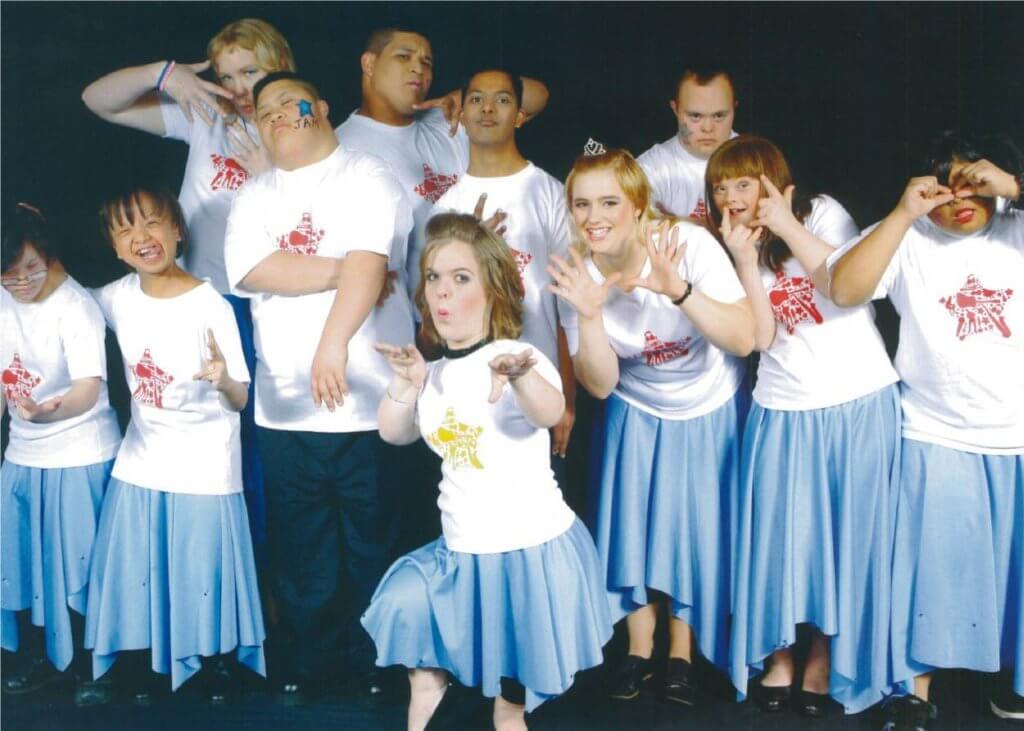
Each month, Grassroots Trust Limited approves funding for many grant applications across sport, education and community sectors.
Please select a month to view grant recipients.
This month, Grassroots Trust Limited contributed $1,909,230.46 to sport, education and community groups.
Download a PDF of April 2024 grant recipients
This month, Grassroots Trust Limited contributed $3,477,031.07 to sport, education and community groups.
Download a PDF of March 2024 grant recipients
February 2024
This month, Grassroots Trust Limited contributed $2,098,555.96 to sport, education and community groups.
Download a PDF of February 2024 grant recipients
January 2024
This month, Grassroots Trust Limited contributed $1,744,598.54 to sport, education and community groups.
Download a PDF of January 2024 grant recipients
December 2023
This month, Grassroots Trust Limited contributed $2,777,259.76 to sport, education and community groups.
Download a PDF of December 2023 grant recipients
November 2023
This month, Grassroots Trust Limited contributed $3,032,931.79 to sport, education and community groups.
Download a PDF of November 2023 grant recipients
October 2023
This month, Grassroots Trust Limited contributed $2,462,995.88 to sport, education and community groups.
Download a PDF of October 2023 grant recipients
September 2023
This month, Grassroots Trust Limited contributed $2,672,281.29 to sport, education and community groups.
Download a PDF of September 2023 grant recipients
August 2023
This month, Grassroots Trust Limited contributed $2,667,538.43 to sport, education and community groups.
Download a PDF of August 2023 grant recipients
This month, Grassroots Trust Limited contributed $2,061,256.92 to sport, education and community groups.
Download a PDF of July 2023 grant recipients
This month, Grassroots Trust Limited contributed $2,324,979.88 to sport, education and community groups.
This month, Grassroots Trust Limited contributed $1,887,965.63 to sport, education and community groups.
Download a PDF of May 2023 grant recipients
This month, Grassroots Trust Limited contributed $2,036,688.00 to sport, education and community groups.
Download a PDF of April 2023 grant recipients
This month, Grassroots Trust Limited contributed $3,907,399.60 to sport, education and community groups.
Download a PDF of March 2023 grant recipients
February 2023
This month, Grassroots Trust Limited contributed $3,605,065.43 to sport, education and community groups.
Download a PDF of February 2023 grant recipients
January 2023
This month, Grassroots Trust Limited contributed $2,592,211.29 to sport, education and community groups.
Download a PDF of January 2023 grant recipients
December 2022
This month, Grassroots Trust Limited contributed $2,821,333.06 to sport, education and community groups.
Download a PDF of December 2022 grant recipients

November 2022
This month, Grassroots Trust Limited contributed $2,044,546.92 to sport, education and community groups.
Download a PDF of November 2022 grant recipients
October 2022
This month, Grassroots Trust Limited contributed $2,549,122.07 to sport, education and community groups.
Download a PDF of October 2022 grant recipients
September 2022
This month, Grassroots Trust Limited contributed $2,705.385.30 to sport, education and community groups.
Download a PDF of September 2022 grant recipients
August 2022
This month, Grassroots Trust Limited contributed $1,903,631.44 to sport, education and community groups.
Download a PDF of August 2022 grant recipients
This month, Grassroots Trust Limited contributed $2,227,671.49 to sport, education and community groups.
Download a PDF of July 2022 grant recipients
This month, Grassroots Trust Limited contributed $2,086,083.42 to sport, education and community groups.
Download a PDF of June 2022 grant recipients
This month, Grassroots Trust Limited contributed $1,839,049.65 to sport, education and community groups.
Download a PDF of May 2022 grant recipients
This month, Grassroots Trust Limited contributed $1,309,479.10 to sport, education and community groups.
Download a PDF of April 2022 grant recipients
This month, Grassroots Trust Limited contributed $2,763,284.67 to sport, education and community groups.
Download a PDF of March 2022 grant recipients
February 2022
This month, Grassroots Trust Limited contributed $1,509,832.09 to sport, education and community groups.
Download a PDF of February 2022 grant recipients
January 2022
This month, Grassroots Trust Limited contributed $2,087,347.48 to sport, education and community groups.
Download a PDF of January 2022 grant recipients
December 2021
This month, Grassroots Trust Limited contributed $2,007,833.55 to sport, education and community groups.
Download a PDF of December 2021 grant recipients
November 2021
This month, Grassroots Trust Limited contributed $950,060.13 to sport, education and community groups.
Download a PDF of November 2021 grant recipients
October 2021
This month, Grassroots Trust Limited contributed $941,203.16 to sport, education and community groups.
Download a PDF of October 2021 grant recipients
September 2021
This month, Grassroots Trust Limited contributed $2,318,047.04 to sport, education and community groups.
Download a PDF of September 2021 grant recipients
August 2021
Due to COVID-19 and our gaming venues being closed, Grassroots Trust did not distribute any funds this month.
Download a PDF of August 2021 grant recipients
This month, Grassroots Trust Limited contributed $2,154,447.48 to sport, education and community groups.
Download a PDF of July 2021 grant recipients
This month, Grassroots Trust Limited contributed $1,842,599.90 to sport, education and community groups.
Download a PDF of June 2021 grant recipients
This month, Grassroots Trust Limited contributed $1,633,437.58 to sport, education and community groups.
Download a PDF of May 2021 grant recipients
This month, Grassroots Trust Limited contributed $1,447,156.47 to sport, education and community groups.
Download a PDF of April 2021 grant recipients
This month, Grassroots Trust Limited contributed $2,325,304.59 to sport, education and community groups.
Download a PDF of March 2021 grant recipients
February 2021
This month, Grassroots Trust Limited contributed $1,444,217.98 to sport, education and community groups.
Download a PDF of February 2021 grant recipients
January 2021
This month, Grassroots Trust Limited contributed $1,967,600.38 to sport, education and community groups.
Download a PDF of January 2021 grant recipients
December 2020
This month, Grassroots Trust Limited contributed $1,932,275.59 to sport, education and community groups.
Download a PDF of December 2020 grant recipients
November 2020
This month, Grassroots Trust Limited contributed $1,339,437.42 to sport, education and community groups.
Download a PDF of November 2020 grant recipients
October 2020
This month, Grassroots Trust Limited contributed $1,373,811.53 to sport, education and community groups.
Download a PDF of October 2020 grant recipients
September 2020
This month, Grassroots Trust Limited contributed $1,342,882.33 to sport, education and community groups.
Download a PDF of September 2020 grant recipients
August 2020
This month, Grassroots Trust Limited contributed $1,885,553.52 to sport, education and community groups.
Download a PDF of August 2020 grant recipients
This month, Grassroots Trust Limited contributed $954,158.59 to sport, education and community groups.
Download a PDF of July 2020 grant recipients
June 2020 – Emergency Relief Fund
During the Emergency Relief Fund, Grassroots Trust Limited contributed a total of $642,923.81 to sport, education and community groups.
Download a PDF of June 2020 – Emergency Relief Fund grant recipients
This month, Grassroots Trust Limited contributed $432,635.52 to sport, education and community groups.
Download a PDF of June 2020 grant recipients
Due to COVID-19 and our gaming venues being closed, Grassroots Trust did not have any funds available for distribution this month.
Download a PDF of March 2020 grant recipients
February 2020
This month, Grassroots Trust Limited contributed $2,515,624.20 to sport, education and community groups.
Download a PDF of February 2020 grant recipients
January 2020
This month, Grassroots Trust Limited contributed $2,864,214.78 to sport, education and community groups.
Download a PDF of January 2020 grant recipients
December 2019
This month, Grassroots Trust Limited contributed $1,550,699.02 to sport, education and community groups.
Download a PDF of December 2019 grant recipients
November 2019
This month, Grassroots Trust Limited contributed $1,698,521.19 to sport, education and community groups.
Download a PDF of November 2019 grant recipients
October 2019
This month, Grassroots Trust Limited contributed $1,556,365.16 to sport, education and community groups.
Download a PDF of October 2019 grant recipients
September 2019
This month, Grassroots Trust Limited contributed $1,567,568.95 to sport, education and community groups.
Download a PDF of September 2019 grant recipients
August 2019
This month, Grassroots Trust Limited contributed $2,294,825.92 to sport, education and community groups.
Download a PDF of August 2019 grant recipients
This month, Grassroots Trust Limited contributed $1,478,872.92 to sport, education and community groups.
Download a PDF of July 2019 grant recipients
This month, Grassroots Trust Limited contributed $1,898,987.84 to sport, education and community groups.
Download a PDF of June 2019 grant recipients
This month, Grassroots Trust Limited contributed $937,023.67 to sport, education and community groups.
Download a PDF of May 2019 grant recipients
This month, Grassroots Trust Limited contributed $1,524,412.77 to sport, education and community groups.
Download a PDF of April 2019 grant recipients
This month, Grassroots Trust Limited contributed $1,667,013.24 to sport, education and community groups.
Download a PDF of March 2019 grant recipients
February 2019
This month, Grassroots Trust Limited contributed $1,710,911.67 to sport, education and community groups.
Download a PDF of February 2019 grant recipients
January 2019
This month, Grassroots Trust Limited contributed $1,420,877.90 to sport, education and community groups.
Download a PDF of January 2019 grant recipients
November 2018
This month, Grassroots Trust Limited contributed $1,501,632.02 to sport, education and community groups.
Download a PDF of November 2018 grant recipients
October 2018
This month, Grassroots Trust Limited contributed $1,169,932.50 to sport, education and community groups.
Download a PDF of October 2018 grant recipients
September 2018
This month, Grassroots Trust Limited contributed $1,415,381.17 to sport, education and community groups.
Download a PDF of September 2018 grant recipients
August 2018
This month, Grassroots Trust Limited contributed $1,288,417.40 to sport, education and community groups.
Download a PDF of August 2018 grant recipients
This month, Grassroots Trust Limited contributed $1,282,173.42 to sport, education and community groups.
Download a PDF of July 2018 grant recipients
This month, Grassroots Trust Limited contributed $1,042,207.33 to sport, education and community groups.
Download a PDF of June 2018 grant recipients
This month, Grassroots Trust Limited contributed $808,436.36 to sport, education and community groups.
Download a PDF of May 2018 grant recipients
This month, Grassroots Trust Limited contributed $1,223,848.42 to sport, education and community groups.
Download a PDF of April 2018 grant recipients
This month, Grassroots Trust Limited contributed $1,209,214.26 to sport, education and community groups.
Download a PDF of March 2018 grant recipients
February 2018
This month, Grassroots Trust Limited contributed $1,253,233.40 to sport, education and community groups.
Download a PDF of February 2018 grant recipients
January 2018
This month, Grassroots Trust Limited contributed $1,095,643.77 to sport, education and community groups.
Download a PDF of January 2018 grant recipients
December 2017
This month, Grassroots Trust Limited contributed $1,173,936.58 to sport, education and community groups.
Download a PDF of December 2017 grant recipients
November 2017
Download a PDF of November 2017 grant recipients
October 2017
This month, Grassroots Trust Limited contributed $925,371.55 to sport, education and community groups.
Download a PDF of October 2017 grant recipients
September 2017
This month, Grassroots Trust Limited contributed $994,142.23 to sport, education and community groups.
Download a PDF of September 2017 grant recipients
August 2017
This month, Grassroots Trust Limited contributed $1,004,154.16 to sport, education and community groups.
Download a PDF of August 2017 grant recipients
This month, Grassroots Trust Limited contributed $1,069,772.89 to sport, education and community groups.
Download a PDF of July 2017 grant recipients
This month, Grassroots Trust Limited contributed $979,329.89 to sport, education and community groups.
Download a PDF of June 2017 grant recipients
This month, Grassroots Trust Limited contributed $753,894.16 to sport, education and community groups.
Download a PDF of May 2017 grant recipients
This month, Grassroots Trust Limited contributed $1,191,018.63 to sport, education and community groups.
Download a PDF of April 2017 grant recipients
This month, Grassroots Trust Limited contributed $2,173,891.86 to sport, education and community groups.
Download a PDF of March 2017 grant recipients
February 2017
This month, Grassroots Trust Limited contributed $776,375.87 to sport, education and community groups.
Download a PDF of February 2017 grant recipients
January 2017
This month, Grassroots Trust Limited contributed $948,292.20 to sport, education and community groups.
Download a PDF of January 2017 grant recipients
December 2016
This month, Grassroots Trust Limited contributed $1,011,283.08 to sport, education and community groups.
Download a PDF of December 2016 grant recipients
November 2016
This month, Grassroots Trust Limited contributed $1,011,211.48 to sport, education and community groups.
Download a PDF of November 2016 grant recipients
October 2016
This month, Grassroots Trust Limited contributed $969,619.55 to sport, education and community groups.
Download a PDF of October 2016 grant recipients
September 2016
Download a PDF of September 2016 grant recipients
August 2016
This month, Grassroots Trust Limited contributed $919,899.36 to sport, education and community groups.
Download a PDF of August 2016 grant recipients
This month, Grassroots Trust Limited contributed $1,117,571.43 to sport, education and community groups.
Download a PDF of July 2016 grant recipients
This month, Grassroots Trust Limited contributed $797,936.60 to sport, education and community groups.
Download a PDF of June 2016 grant recipients
This month, Grassroots Trust Limited contributed $978,511.28 to sport, education and community groups.
Download a PDF of May 2016 grant recipients
This month, Grassroots Trust Limited contributed $802,868.24 to sport, education and community groups.
Download a PDF of April 2016 grant recipients
1 April 2015 – 31 March 2016
For the year end 31 March 2016, Grassroots Trust Limited contributed $9,263,064.45 to sport, education and community groups.
Download a PDF of 1 April 2015 – 31 March 2016 grant recipients
1 April 2014 – 31 March 2015
For the year end 31 March 2015, Grassroots Trust Limited contributed $7,254,440.29 to sport, education and community groups.
Download a PDF of 1 April 2014 – 31 March 2015 grant recipients
1 April 2013 – 31 March 2014
For the year end 31 March 2014, Grassroots Trust Limited contributed $5,950,025.20 to sport, education and community groups.
Download a PDF of 1 April 2013 – 31 March 2014 grant recipients
1 April 2012 – 31 March 2013
For the year end 31 March 2013, Grassroots Trust Limited contributed $1,337,212.66 to sport, education and community groups.
Download a PDF of 1 April 2012 – 31 March 2013 grant recipients

Not sure who to apply to?
Which community will benefit from the funding you wish to apply for?
David Seymour announces funding to keep school lunch programme, extends it to under 5s
- Molly Swift
More children will receive free lunches under changes to the healthy school lunches programme, the Government has announced.
It follows months of uproar from schools, academics and Opposition politicians after Associate Education Minister David Seymour hinted at cuts to the free lunch programme.
More from Newshub
Ka Ora, Ka Ako Healthy School Lunches Programme, introduced by the previous Labour Government, supplies approximately 235,000 students in more than 1000 schools with free lunches; this equates to approximately 40 percent of all schools and approximately 27 percent of all students.
Seymour has been working on a proposition on the fate of the programme, however, his comments surrounding the scheme have prompted concern from schools. He has previously said it was a "huge waste of money" and "it should be gone".
In a shocking twist, Seymour has now announced the programme will continue - and in fact, be extended to some under five-year-olds.
"The Healthy School Lunches Programme will continue, alongside a new targeted programme for up to 10,000 two-to-five-year-olds in early learning services," Seymour said on Wednesday.
"I am pleased to announce there will be a new targeted programme to provide food to 10,000 two-to-five-year-olds who attend low-equity, not-for-profit, community-based early learning services, funded using the cost savings found in the lunch programme.
"The first 1000 days are key to a child's development. I am proud this Government can innovate to help even more children who need it."
Labour has called the move a backtrack, claiming Seymour couldn't get the cuts he wanted to the programme.
"I welcome Government funding food in ECEs and am relieved that for all of David Seymour's talk he hasn't got his cuts over the line in primary schools," Labour education spokesperson Jan Tinetti said.
"I am worried about the changes at intermediate and secondary schools and will continue to campaign for keeping and improving the programme."
In response, Seymour said the previous Government hadn't set aside the necessary funding to continue the programme.
"They've cut it 100 percent, and I've saved it after they couldn't get their books in order," Seymour said.
Despite the extension of the programme, the Government will cut approximately $107 million a year from how it was previously funded - $4 million of which will go to the Early Childhood Food Programme.
Seymour said the $107 million comes from savings obtained by using a new, alternative model.
What the new model will look like
The current programme is delivered by a mix of models depending on the different schools' needs.
For the remainder of 2024, the school lunches programme will stay as is with all current contracts and commitments in place before moving to a new model for students over year 7 next year.
Currently, the Government contracts 156 suppliers to provide lunches to schools aka the external model, while other schools purchase the goods directly from suppliers in the internal model.
At the beginning of next year, the Government will move students above primary school level to a new alternative model. This model will use "commercial acumen and Government's considerable buyer power" to purchase the food nationally and distribute these to schools with students year 7 and over. The model for students in years 0-6 will stay the same.
Composite schools with students across different year levels will need to implement a dual model of learners according to their age. For example, schools with students from years 0 to 13 will keep the status quo for years 6 and under and use the alternative model for years 7 plus.
An expert advisory group will assist the Ministry of Education in determining the details of the new model. The expert group and the Ministry will engage with representatives from affected schools.
While the programme will be universal in schools that receive it, parents and students will be able to opt-out of receiving the lunches if they wish.
The new model will also allow schools to align their ordering with attendance.
"In many schools, taxpayers are catering and paying for lunches for students who do not appear to be there to eat them. It is estimated that this cost approximately $15 million in the first three terms of 2023," the Government said.
The type of food students will receive is also likely to change.
"It will be made up of the sorts of food items thousands of mums and dads put into lunch boxes every day for their kids – forget quinoa, couscous, and hummus, it will be more like sandwiches and fruit," Seymour said.
The range of food on offer will depend on the suppliers selected and the nutritional value of the food will be a consideration of this process.
Schools will be able to select foods based on preference, as well as facilities and capacity.
For students with standard dietary requirements, the Ministry of Education will work through an open tender process to source a supplier for the alternative provision model.
Options for providing for students with complex special diets will also be considered as part of the procurement process.
This Government's 2024 Budget will provide $478 million of funding for the school lunches programme.
The funding will be put towards the interim model, which would be put in place for 2025 and 2026 while a full redesign of the programme is implemented based on commercial experience, data and evidence.

Navigation for News Categories
Charter schools might increase government costs, deliver marginal benefits - cabinet papers.

Associate Education Minister David Seymour says there is "no reason to disallow" for-profit charter schools as long as they are meeting students' educational needs. Photo: RNZ/Nick Monro
Charter schools will increase government costs and might deliver only marginal benefits, Cabinet papers indicate.
The papers show the $153 million allocated over four years for reviving the schools - which are publicly funded but privately owned - is mostly for the extra cost of opening and administering the schools.
Not included in that figure was the money the schools would receive for their students that would otherwise go to the state schools they attended.
Associate Education Minister David Seymour told RNZ: "When state schools convert to charter schools, or when students transfer from state schools to charter schools, there will be baseline funding that effectively 'follows the school' or 'follows the child'."
However, the papers indicated the transfer would not be cost-neutral to the government for newly created charter schools.
They said the students were likely to be funded at a higher per-student rate because charter schools were generally small, and small schools received higher per-student funding than larger schools.
The papers showed the Ministry of Education estimated the schools might deliver a benefit equivalent to up to $1250 per student per year - but only if they were 10 percent more efficient at delivering education than state schools.
"We consider it unlikely that changing to a charter school model could improve efficiency by more than about 10 percent," they said.
However, long-term benefits could be greater, the papers said.
The ministry had advised that improvements to student achievement were possible, but overseas and New Zealand evidence was mixed.
"Evidence from other jurisdictions show mixed results on whether model [sic] will benefit achievement and engagement," it said.
"There is evidence that partnership schools attracted a high proportion of "priority learners" (Māori, Pacific, students with learning support needs, and students from low socio-economic backgrounds), as was intended by the policy, including roughly double the proportion of students from a long-term benefit-dependent household, or those with an Oranga Tamariki notification, relative to state schools.
"However, it was unclear if the model had an impact on the academic achievement for these specific learner groups."
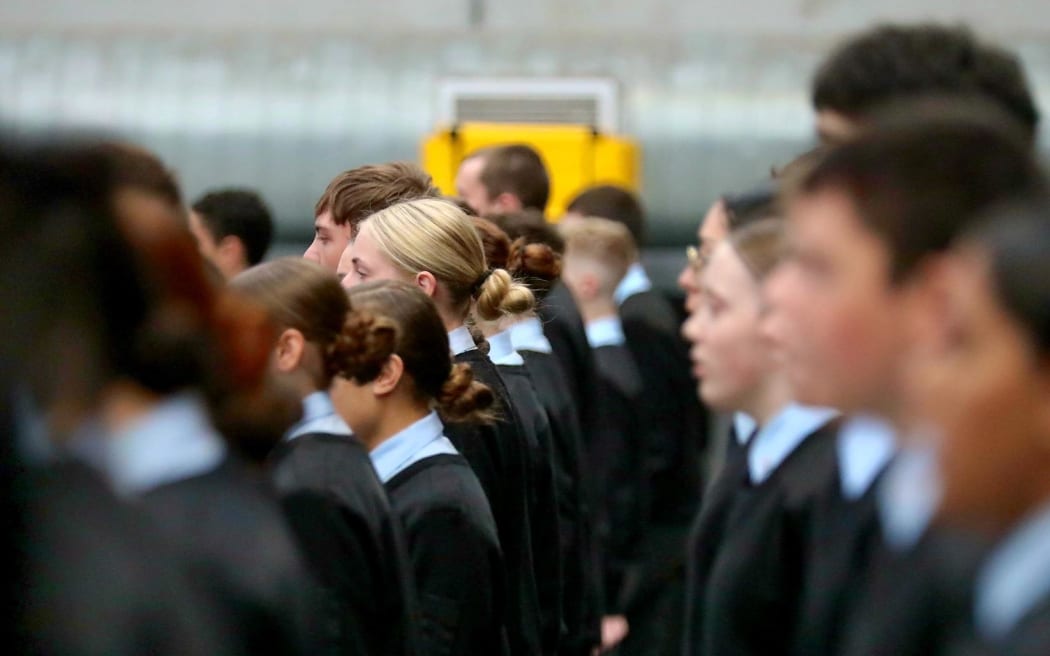
Vanguard Military School in Auckland was one of New Zealand's first charter schools and was opened in 2014. It later converted to a 'designated character' state school when the Labour government halted the charter schools programme. Photo: RNZ/Nick Monro
The biggest improvements might occur if existing kura kaupapa Māori that were struggling to grow converted to charter schools and enrolled more children, the papers said.
"Overall, the evidence suggests that under the right settings (such as good leadership, implementation, and a widespread uptake of the model) school choice policies can drive innovation, improve efficiencies in the system and improve outcomes for students."
Though for-profit schools would be permitted, the ministry said based on the previous round of schools "we expect very little profit to be taken".
Seymour said there was "no reason to disallow" for-profit schools as an option if they ensured the educational needs of students were being met and they were accountable for positive outcomes.
"Operating for profit can also encourage investment in charter schools. Profit is also not a deduction."
The papers also showed that distance education charter schools would be allowed, breaking the monopoly on state-funded distance schooling held by Te Kura The Correspondence School.
Seymour said a separate funding model would be considered for distance charter schools.
"While it is not envisaged that any distance charter schools will open in the first year, the charter school model is designed to give greater flexibility to innovate, and it allowed for distance schools in the future - in the event that a suitable sponsor wants to apply," he said.
"Any potential distance schools will still need to meet the mandatory requirements for becoming a charter school. As well as that, when the Authorisation Board is deciding whether to approve any distance schools, it will consider the size of the school, whether students are full time or part time, whether the students are onshore or offshore, as well as plans to provide adequate pastoral care to distance students.
Large sections of the papers relating to the conversion of state schools to charter schools were redacted.
Seymour said that was because some of the information was under active consideration and some was legal advice.
However, they showed that the Crown would retain ownership of any school buildings and land it already owned.
They also showed that local students would retain the right to continue attending a school that converted to charter status.
Copyright © 2024 , Radio New Zealand
Related Stories
Charter schools: are they better than public schools.

What exactly are charter schools and what makes them different to regular public schools? Here's what you need to know.
Doubts about charter schools results, figures show
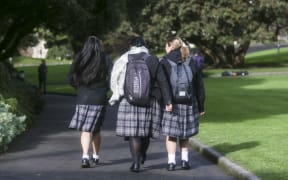
Reintroduced charter schools will be tightly monitored, but a lack of transparency in reporting was a key criticism they faced last time around. Audio
Up to 35 public schools to become charter schools, will be exempt from phone ban

Up to 50 charter schools will be funded with $153m out of Budget 2024, David Seymour has announced.
Lack of oversight of charter schools' student achievement, finances
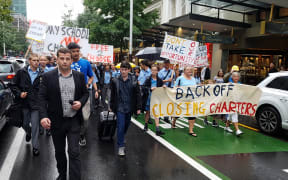
Ministry documents reveal former partnership schools had major gaps in monitoring. Audio
Charter Schools establishment board to aim for openings in 2025
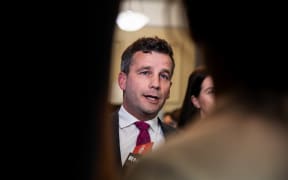
Eight people have been appointed to a board tasked with helping reintroduce charter schools for 2025.
- Revamped school lunches may be less healthy - principal
- Rebuke issued in stoush over volume of on-bus announcements for blind passengers
- All options being considered to help New Zealanders in New Caledonia - Winston Peters
Get the RNZ app
for ad-free news and current affairs

Top News stories
- ‘I disagree’: Kiwi Olympic star Eliza McCartney’s selection policy critique
- Former All Black Sid Going dies at age 80
- Breast cancer patient left 'humiliated' over Ballantynes bra subsidy treatment
- Fire at Auckland's Gulf Harbour Country Club
- France accuses Azerbaijan of meddling in New Caledonia on social media
Politics RSS
Follow RNZ News
School's traffic concerns raised with MP
- Kids / Family
- Franklin Ward

Two reports on Ardmore School traffic have reached different conclusions.
Auckland Transport says its engineers surveyed traffic in response to Franklin Local Board and school concerns and found drivers were well-behaved.
But a police report called for action to avoid a serious harm or death incident.
Despite AT reporting no significant concerns, local board chair Angela Fulljames says there are issues around access the school will work on with the Ministry of Education.
“We can only advocate. Wairoa subdivision member Malcolm Bell is working on that and has met with the Papakura MP Judith Collins.
“While It’s reassuring AT found driver behaviour was good – as you would hope near a school – the police report says there’s limited safe parking and the gravel parking area leaves motorists exposed.
“On top of that, we believe further growth will increase traffic, including trucks.”
The police report found speeding compromised safety, calling for vegetation near the school to go, the gravel area west of the entrance to be enlarged, lower permanent speed limits, and more enforcement.
Ardmore School is on Papakura-Clevedon Road - a secondary arterial road carrying about 5,000 vehicles a day, with flows higher on weekdays, AT putting that down to commuter and business traffic.
Heavy traffic, a concern for the school, makes up about 540 trips a day. The Clevedon Quarry Resource Consent requires trucks to find reasonable alternative routes to passing the school.
“The speed limit is 80km/h but 40km/h in school hours, and has been for years, so there’s no excuse for speeding,” Bell says.
“I joined others to see traffic patterns and pedestrian behaviour, finding some congestion, mostly caused by driveway manoeuvres and reverse parking.”
Fulljames says just as at all schools, children cross from between cars. “That underlines how important it is to take extreme care.”
AT says the existing conditions are sufficient to address any risks but last August it consulted on its draft Speed Management Plan, proposing a reduced limit in the area.
Late in April the school’s trustees issued a statement saying the infrastructure around the school was not sufficient for caregivers to safely pick up and drop off their children.
It called for the Ministry of Education to buy Bell Field, council-owned land next to the school. “That would be a safe, easy way to make every day safer for hundreds of children.”
Stay connected
Sign up for your Local Board E-news and get the latest news and events direct to your inbox each month. Or follow us on Facebook.
- Share via Facebook
- Share via X
- Share via LinkedIn
- Share via Email
This website requires cookies to provide all of its features.
For more information on what data is contained in the cookies, please click the 'Read More' button. To accept cookies from this site, please click the 'I Agree' button.
I agree Read More

Sign up for our e-newsletter and be the first to know about exciting events and news.

School transport
This directory page provides links and resources to a range of topics related to school transport. They support schools, transport service providers and the wider community to understand the Ministry’s role regarding transport assistance, to meet their health and safety obligations, and more.
Further reading on these topics is essential as it regards information and mandatory action for board members and transport service providers.
Parents, caregivers and whānau may benefit from reading about transport assistance to understand whether their student is eligible.
School transport assistance
Roles and responsibilities guides, managing safety, behaviour and accidents, information for schools.
- Information for transport service providers
School transport contacts
The Ministry of Education provides school transport assistance to help parents overcome barriers to education and meet their responsibility to get their children to school. We may provide assistance where distance and/or accessibility may be a barrier for students attending the closest school they can enrol at.
We deliver school transport assistance via the following:
- Daily school buses
- Technology class school buses
- Conveyance allowance
- Specialised school transport assistance (SESTA)
- Direct resourcing
- Māori-medium schools
Delivering our ākonga to school safely and ready to learn involves many parties, who each have an important role to play and responsibilities to meet.
Our roles and responsibilities guides outline the roles and responsibilities of the school transport operators, schools, caregivers, students and the Ministry to ensure the successful coordination and delivery of school transport services.
Daily and technology school bus: Roles and responsibilities guide [PDF, 351 KB]
Directly resourced schools: Roles and responsibilities guide [PDF, 333 KB]
SESTA: Roles and responsibilities guide [PDF, 113 KB]
Draft guide for Māori-medium schools
We’re currently gathering feedback on the draft roles and responsibilities guide for Māori-medium schools.
Māori-medium schools: Roles and responsibilities guide [PDF, 388 KB]
Please send your feedback to: [email protected] .
When there is an accident or incident on school transport, it is the driver or transport service provider's (TSP) responsibility to contact emergency services (on 111).
The driver will then follow the health and safety guidelines of the transport provider.
Accidents and incidents on school transport
Safety and behaviour on school transport
Apply for school transport assistance – School Transport Hub
Bus controllers
Daily school bus route maps
Directly resourced schools
Māori-medium schools (English)
Māori-medium schools (te reo Māori)
Route design
Technology school buses
Information for transport service providers
School Transport Hub | Pokapū Waka Kura
Automatic vehicle location technology
School bus procurement
Find out how to contact your Ministry regional transport advisors and national school transport team.
Last reviewed: 18 April 2024 Has this been useful? Give us your feedback

Iowa high schoolers thank Xi for 'fully funding' field trips to China
Posted: May 15, 2024 | Last updated: May 15, 2024
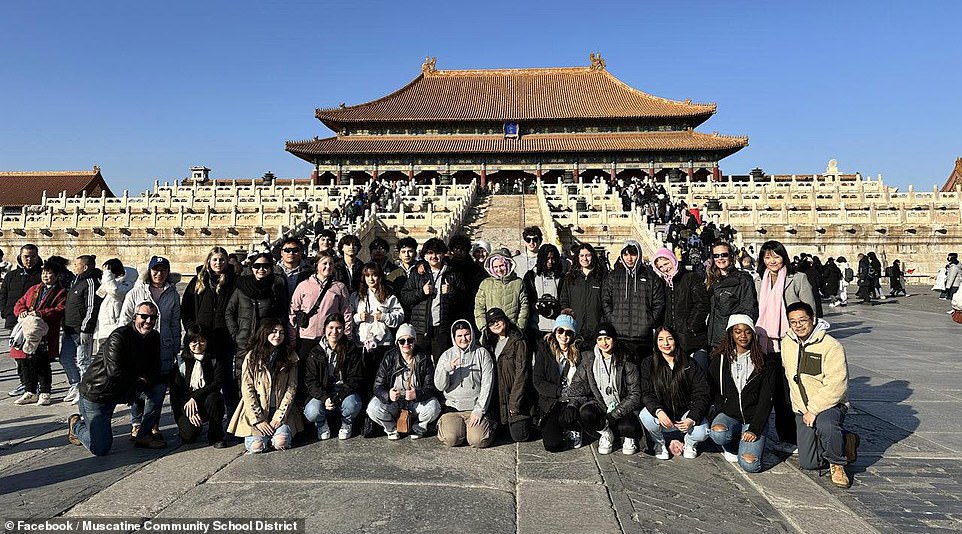
More for You
7 Things the Middle Class Won’t Be Able To Afford in the Next 5 Years
Donald Trump's Chances of Flipping Minnesota, According to Polls
I moved my family from California to Austin, Texas, and regretted it. Here are 10 things to consider before making an expensive mistake.
The Best Tea for Lowering High Blood Pressure, Recommended by a Dietitian
The Coolest Car From the Year You Were Born (1945-1995)
A Study Suggests We Found Potential Evidence of Dyson Spheres—and Alien Civilizations
How do you mend a broken Heart? Ann and Nancy Wilson know.
Fmr. Trump attorney: ‘If I was his lawyer, I would threaten to resign’ if Trump wanted to testify
5 Odd Facts About The Boeing B-52 Stratofortress That You May Not Know
Celine Dion Shared a Rare Family Photo With Her 13-Year-Old Twins
The 4 Best Fruits for Lower Blood Pressure, According to a Cardiologist
Garfield by Jim Davis
Russians report drone attack on Military Academy of the Signal Corps in St. Petersburg
This U.S. State Is One of the Best Places to Retire for Low Crime, Taxes, and an Affordable Cost of Living
‘I’m weary of repeating myself’: How do I deal with rich friends who take $22,000 cruises and book $800 hotel rooms? Prices are crazy enough already.
Scientists May Have Found a Particle Made of Pure Force
8 Dog Breeds That Look Like Puppies Forever
These 61 House Democrats voted against a resolution that condemns calls to defund the police
Social Security COLA Increase Slammed as New Estimate Released
Chiefs 2024 NFL schedule breakdown: Game-by-game predictions, toughest stretch, opponents, pivotal matchups
Close proximity of fast food outlets proving difficult for Whanganui schools

Eva de Jong
Share this article
Whanganui Intermediate School principal Katherine Ellery said students from Whanganui schools often visit fast food outlets on Victoria Avenue straight after school ends. Photo / Bevan Conley
Fast food outlets can be hot spots for students after school, with one professor suggesting the development of new premises near schools could be regulated.
Whanganui reporter Eva de Jong asks principals and outlets what they think.
Whanganui City College deputy principal Valerie Rooderkirk says there are several fast food outlets located less than a 1km walk away from the central city school.
She says Wi-Fi and cheap food make them a meeting point for students from multiple Whanganui schools.
“When fast food outlets have those things readily available, that’s where kids are going to go and sit and catch up,” Rooderkirk said.
Just down the road, Whanganui Intermediate School principal Katherine Ellery said fast food outlets were often packed with students after school and it was “pretty concerning”.
“From 2.45pm onwards, it’ll be 45 minutes of chaos.
“As a community, we all need to be aware that our children are meeting in that environment - and are we okay with that?”
Ellery said it would be good if students weren’t served when in school uniform or within an hour of the school bell ringing, but for that to work, there would have to be a collective agreement between fast food outlets.
“I’d love that, because what that would tell me is they’ve gone home and got changed, and are 100 per cent under their parents’ care.”
A McDonald’s spokesman said while there had been no recent reports of issues or patterns regarding antisocial behaviour from students after school, as with any retail business, McDonald’s had procedures in place to deal with incidents as they occurred.
“We strive to make McDonald’s restaurants an inclusive and safe space for all our customers. Banning anyone is a last resort, and we’d suggest there may be unintended consequences in calling on the likes of McDonald’s to ban specific groups of people.”
The spokesman said Darren and Jacinta Rowland had been the Whanganui franchisees since 2007, raising their family in the city, and they currently employ over 150 locals, many of whom are students.
“They take their role in the community very seriously, supporting a wide range of causes. They also liaise with schools, police and other organisations to play a positive role in Whanganui. "
University of Waikato associate professor Victoria Egli said advertisements and large numbers of fast food outlets being located in close proximity to schools meant an increase in exposure to kids.

A recent study Egli undertook in Auckland shows a statistically significant relationship between the amount of unhealthy food and drink advertising around the school and the socio-economic deprivation of the area.
“We know that repeated exposure to unhealthy food and drink normalises consumption, and what that does is lead to unhealthy dietary patterns.”
Dietary patterns that were established in childhood were generally carried forth into adulthood, she said.
“If you’re a kid that gets into the habit of going to a fast food outlet after school, then you’re much more likely to be an adult who does the same thing after work.”
A Restaurant Brands - which owns KFC and Pizza Hut - spokeswoman said they worked with media agencies to make sure advertising content reached the right audience, in line with Advertising Standards Authority (ASA) guidelines.
Burger King was also contacted for this story.
Rooderkirk said students bought fast food because it was the most affordable option.
“When it’s cheaper to buy a frozen coke than anything else reasonably healthy, what are you going to choose?”
Egli said the Government and local councils could make policy decisions, such as banning the development of new outlets near schools .
A McDonald’s spokesman said the location of McDonald’s restaurants relates to factors such as traffic, accessibility, trading conditions and zoning.
They were aware of some academic research released earlier this week, but were still reviewing the detail and methodology.
“We have a range of measures in place relating to schools and potential exposure to McDonald’s advertising.
“This includes placing no out of home advertising within 300m of a school, which includes the digital billboards in Whanganui. Our restaurants also do not have any exterior posters or banners promoting food if they are located near schools.”
Government announces new funding for free school lunches
The Ka Ora, Ka Ako school lunches programme will get $478 million from the Government, with Associate Education Minister David Seymour aiming to save $107m a year through no-frills lunches .
Rooderkirk said the school lunches programme helps to prevent students from leaving school at break-time to buy fast food.
“If kids were having to bring their lunch, they wouldn’t. They’d bring money and buy deep-fried chicken and chips.”
The school lunches programme currently feeds about 235,000 students at schools across the country - with the new funding keeping the scheme going until the end of 2026.
Egli said Kai Ora, Ka Ako offered an alternative to the environment kids were growing up in that was “dominated by ultra-processed food and drink companies”.
In Whanganui, 26 schools are also served breakfast through the KickStart breakfast programme.
Eva de Jong is a reporter for the Whanganui Chronicle covering health stories and general news. She began as a reporter in 2023.

Latest from Whanganui Chronicle

One dead two-car crash south of Whanganui
State Highway 3 is blocked near Turakina after a person died in a car crash.

Gardening: Hardy plants for hardy places

Whanganui District Outdoors quiz

Clear skies, cool nights expected this weekend

Advancing NZ’s enterprise technology

COMMENTS
All you need to know about the process for applying for a Max e-Grant, key dates, who is eligible and how the grants can be used. The Max e-Grants programme provides small grants of up to $5,000 to Ministry of Education licensed New Zealand schools and pre-schools to support children aged 4-18 years to achieve educational participation.
Applications, accompanied by the proposed travel itinerary, MUST be submitted via email to the Foundation at [email protected] no later than six (6) weeks prior to the intended visit to He Tohu. If posting, please address to: Director Public Engagement. Te Puna Foundation. PO Box 1467, Wellington 6140.
Familiarise yourself with your school's emergency plan. Your school will have an emergency management plan in place for emergencies, traumatic incidents, evacuations and lockdowns. These may be useful for planning emergency procedures while overseas. Preparing for emergencies, traumatic incidents, evacuations and lockdowns.
Years 9-13: Students must live at least 4.8km from the school, over the shortest public road or pedestrian route from the home roadside gate to the school's front gate. 3. There must be no suitable public transport. Suitable public transport must travel within: 2.4 kilometres of the roadside gate of the student's home.
To date Make It Happen has paid out over $235,000 in grants to children and their families in our community. ... SPORTS FEES & LESSONS SPORTS TRIPS SCHOOL CAMPS DANCE & DRAMA THERAPY & AID MUSIC and ARTS ACADEMIC GRANTS SCHOOL UNIFORMS, STATIONERY AND SUPPLIES. SPORTS FEES & LESSONS $ 388
Additional funding is provided for ākonga receiving the multiple barriers allowance to support them at school. For example, counselling, uniform, extra-curricular activities. The additional funding is an annual one-off payment of $540 and is paid in addition to the Term 1 multiple barriers payment. Additional travel funding for island communities
Students chosen to represent New Zealand internationally through a national or international competition or selection basis can apply to the Talented School Students Travel Awards to then formally request funding to cover their travel costs. The Talented School Students Travel Award is funded by MBIE and administered by the Royal Society Te ...
The Travel Fund Programme for Schools to visit Parliament is designed to assist, encourage and support schools in bringing students to Parliament. Financial support takes the form of a 'contribution' to the costs associated in traveling to Wellington rather than a full grant meeting all costs. The Trust is active in promoting education and ...
universities in New Zealand. The Travel Fund Programme for Schools to visit Parliament is designed to assist, encourage and support schools in bringing students to Parliament. Financial support takes the form of a 'contribution' to the costs associated in travelling to Wellington rather than a full grant meeting all costs.
Cancellation of service: If a student no longer requires a SESTA service please notify School Transport at [email protected] Appealing a decision If you want to appeal a decision, contact your school's Learning Support Coordinator (or the Learning Support Manager at the local Ministry of Education office) for support through ...
Individual Grants are available from $200- $2,000 with the average grant amount awarded $500. As a Parent/Caregiver do I need to apply for an Individual Grant through my School Champion? If your child's school has a Variety School Champion they may be able to assist you in submitting a grant application and getting the documents you require.
Your school will tell you if a Ministry-funded service is cancelled because public transport has become available. Apply now. To apply for school transport assistance, talk to your child's school about whether they are eligible for: A place on a school bus. The school's bus controller will arrange the details of the transport with you.
Kiwi Kid Sponsorship (KKS) provides ongoing support for children from 4 to 17 years old. Children on KKS are matched to a sponsor who helps pay for the cost of essential things like clothing, towels, bedding, school uniforms and stationery, school camp and extracurricular activities like swimming or music lessons.
Criteria 2. Students must live more than a certain distance from the school, depending on their year level: Years 1-8: at least 3.2 kilometres from the school. Years 9-13: at least 4.8 kilometres from the school. These distances are measured by the shortest public road or pedestrian route from the home roadside gate to the school's front gate.
Funding. The Ministry of Youth Development (MYD) - Te Manatū Whakahiato Taiohi - spends around $12.062 million (excluding the Ākonga Youth Development Community Fund) per year on a wide range of youth development and youth enterprise initiatives. We fund organisations that employ a youth development approach which supports the wellbeing ...
Information on programmes, services, and initiatives currently funded by MYD (2023-2025) can be found here. Queries can be directed to MYDfunding [at]msd.govt.nz. Please click here to learn more about programmes funded through the Ākonga Youth Development Community Fund. Future funding opportunities will be published on this webpage, and MYD's ...
Grants can only be issued to sport teams/clubs that are formally established and/or legally constituted or can show affiliation to the national organisation. Touch modules must provide a photocopy of their Touch NZ membership card. No grant will be issued to a player or team competing on a professional basis.
Welcome to Eco-Schools. Eco-Schools is operated internationally by the Foundation for Environmental Education (FEE) and is managed in New Zealand by Keep New Zealand Beautiful. It currently has 19.5 million students and educators, from 59,000 schools in 74 countries, engaging with its sustainable development education programme.
As an overseas-trained teacher coming to New Zealand, you may be eligible for the grant which covers relocation costs of up to NZD$10,000. The grant can cover or contribute towards a range of relocation costs including registration with the Teaching Council of Aotearoa New Zealand, temporary accommodation in New Zealand, airfares and relocation costs for immediate family members.
The funding will go towards establishing and operating up to 15 new charter schools and converting 35 state schools to charter schools in 2025 and 2026 depending on demand and suitability.
New Zealand's network of schools; Ministry Bulletin for School Leaders | He Pitopito Kōrero; Board information; School terms and holiday dates ; Camps, trips and education outside the classroom. A school or kura can continue to ask for donations for overnight school camps, even if they are part of the core learning programme (curriculum).
Defining Moments is a division of House of Travel Whangarei Limited, part of the House of Travel Group - New Zealand's largest independently owned company. We are 100% New Zealand owned and operated and a fully bonded member of TAANZ - the Travel Agents' Association of New Zealand Incorporated since 1991. TAANZ is a self-regulating body ...
April 2024. This month, Grassroots Trust Limited contributed $1,909,230.46 to sport, education and community groups.. Download a PDF of April 2024 grant recipients
Seymour said the changes would lift declining educational outcomes. "Charter schools provide educators with greater autonomy, create diversity in New Zealand's education system, free educators from state and union interference, and raise overall educational achievement, especially for students who are underachieving or disengaged from the current system."
The funding will be put towards the interim model, which would be put in place for 2025 and 2026 while a full redesign of the programme is implemented based on commercial experience, data and ...
Charter schools will increase government costs and might deliver only marginal benefits, Cabinet papers indicate.. The papers show the $153 million allocated over four years for reviving the schools - which are publicly funded but privately owned - is mostly for the extra cost of opening and administering the schools.. Not included in that figure was the money the schools would receive for ...
Heavy traffic, a concern for the school, makes up about 540 trips a day. The Clevedon Quarry Resource Consent requires trucks to find reasonable alternative routes to passing the school. "The speed limit is 80km/h but 40km/h in school hours, and has been for years, so there's no excuse for speeding," Bell says.
Draft guide for Māori-medium schools. We're currently gathering feedback on the draft roles and responsibilities guide for Māori-medium schools. Māori-medium schools: Roles and responsibilities guide [PDF, 388 KB] Please send your feedback to: [email protected]. Managing safety, behaviour and accidents
The Chinese Communist Party paid for multiple trips to China for small-town Iowa high schoolers who exchanged letters with President Xi Jinping and praised the country and its leader.
The school lunches programme currently feeds about 235,000 students at schools across the country - with the new funding keeping the scheme going until the end of 2026.